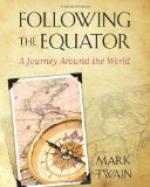In Agra and its neighborhood, and afterwards at Delhi, we saw forts, mosques, and tombs, which were built in the great days of the Mohammedan emperors, and which are marvels of cost, magnitude, and richness of materials and ornamentation, creations of surpassing grandeur, wonders which do indeed make the like things in the rest of the world seem tame and inconsequential by comparison. I am not purposing to describe them. By good fortune I had not read too much about them, and therefore was able to get a natural and rational focus upon them, with the result that they thrilled, blessed, and exalted me. But if I had previously overheated my imagination by drinking too much pestilential literary hot Scotch, I should have suffered disappointment and sorrow.
I mean to speak of only one of these many world-renowned buildings, the Taj Mahal, the most celebrated construction in the earth. I had read a great deal too much about it. I saw it in the daytime, I saw it in the moonlight, I saw it near at hand, I saw it from a distance; and I knew all the time, that of its kind it was the wonder of the world, with no competitor now and no possible future competitor; and yet, it was not my Taj. My Taj had been built by excitable literary people; it was solidly lodged in my head, and I could not blast it out.
I wish to place before the reader some of the usual descriptions of the Taj, and ask him to take note of the impressions left in his mind. These descriptions do really state the truth—as nearly as the limitations of language will allow. But language is a treacherous thing, a most unsure vehicle, and it can seldom arrange descriptive words in such a way that they will not inflate the facts—by help of the reader’s imagination, which is always ready to take a hand, and work for nothing, and do the bulk of it at that.
I will begin with a few sentences from the excellent little local guide-book of Mr. Satya Chandra Mukerji. I take them from here and there in his description:
“The inlaid work
of the Taj and the flowers and petals that are to
be found on all sides
on the surface of the marble evince a most
delicate touch.”
That is true.
“The inlaid work,
the marble, the flowers, the buds, the leaves, the
petals, and the lotus
stems are almost without a rival in the whole
of the civilized world.”
“The work of inlaying
with stones and gems is found in the highest
perfection in the Taj.”
Gems, inlaid flowers, buds, and leaves to be found on all sides. What do you see before you? Is the fairy structure growing? Is it becoming a jewel casket?
“The whole of
the Taj produces a wonderful effect that is equally
sublime and beautiful.”
Then Sir William Wilson Hunter:
“The Taj Mahal
with its beautiful domes, ‘a dream of marble,’
rises
on the river bank.”




